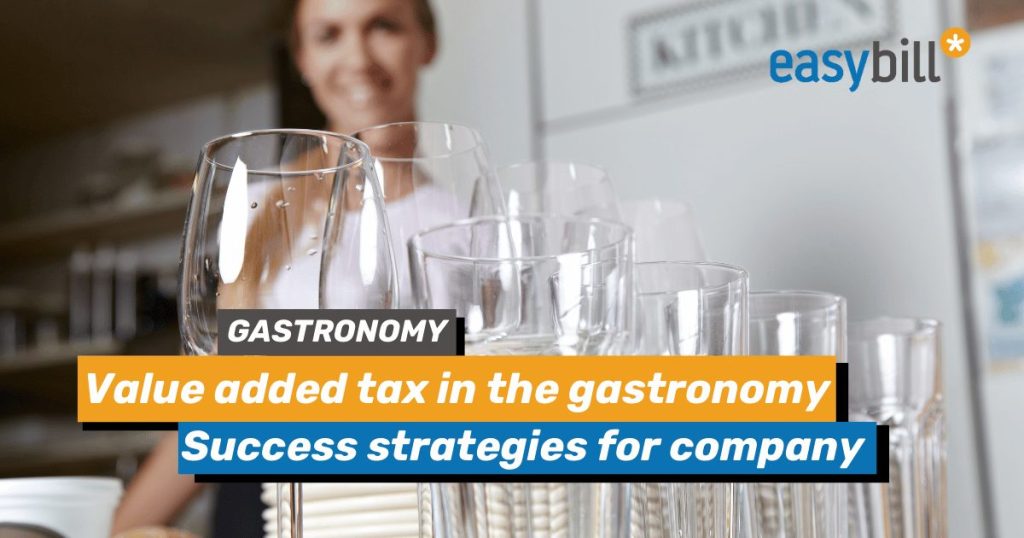
The importance of VAT in the hospitality industry
Value added tax (VAT) plays a central role in the catering industry, going far beyond simple price calculation. It influences both business planning and the competitiveness of restaurants, cafés and other catering establishments. An understanding of the applicable regulations and the optimal application of this tax is crucial for the long-term success of catering businesses.
Current regulations on VAT in the catering industry
In Germany, different tax rates apply to the catering industry. The regular VAT rate of 19% is levied on food for consumption on site, while the reduced tax rate of 7% applies to takeaway food or certain foodstuffs. This distinction poses a challenge, as different products and services are often offered that have to be taxed differently.
There are currently repeated discussions about adapting these regulations, particularly in light of the economic impact of the coronavirus pandemic.
Advantages of reduced VAT for catering businesses
The introduction of reduced VAT on certain catering services was a welcome relief for many businesses. Particularly in difficult economic times, such as during the pandemic, the reduction in VAT has helped many businesses to secure their liquidity.
For diners, lower prices offer an additional incentive to eat out more often. Restaurants can benefit from clever pricing and cost reductions.
Strategies for the optimal use of VAT in the hospitality industry
In order to make the best possible use of VAT, businesses should ensure a clear differentiation between the various tax rates. Detailed bookkeeping and regular training of employees in dealing with VAT are essential. It is also worth incorporating potential savings resulting from the reduction in VAT into pricing in a targeted manner in order to strengthen competitiveness.
More on the subject of value added tax
Do you need more information on this topic? Find out more here.
The role of VAT in pricing
VAT has a direct influence on pricing in the food service industry. Businesses must weigh up the extent to which they pass on the tax relief to their customers or keep it for themselves in order to increase their profit margins. Transparent communication of price adjustments can boost customer confidence, especially if price increases become necessary. Clever use of VAT regulations therefore not only offers economic advantages, but also marketing opportunities.
Tax aspects and legal framework conditions
The correct payment of VAT is of crucial importance for every catering business. Incorrect calculation or improper separation of the different tax rates can have considerable legal consequences. It is therefore advisable to regularly inform yourself about current changes in tax law and, if necessary, to consult tax advisors in order to avoid mistakes.
Case studies: Successful catering businesses and their VAT strategies
Many successful catering businesses have found creative ways to make the most of VAT. For example, some businesses combine the sale of takeaway food with on-site consumption in order to benefit from the different tax rates. Others have managed to retain the trust of their customers through transparent communication with guests and a gradual price adjustment, while at the same time increasing their profitability.
Tips for training your employees with regard to VAT
Training employees in dealing with VAT is crucial for the smooth operation of a catering business. Understanding the different tax rates and how to apply them is important to avoid mistakes. Regular workshops and training can ensure that staff are always up to date with the latest legal requirements. This creates security and increases efficiency in day-to-day operations.
To get started, the easybill VAT calculator may also help to make invoicing easier for your employees.
Outlook: Future developments in VAT in the food service industry
The future of VAT in the hospitality industry remains exciting. The experiences of recent years in particular have led to new discussions about a permanent reduction in the VAT rate for the catering industry. The industry is eagerly awaiting whether there will be long-term relief or whether the existing regulations will be retained. Catering businesses should remain flexible and always keep an eye on possible changes in tax policy.
How to benefit from the VAT regulations in the long term
VAT in the hospitality industry offers numerous opportunities, but also challenges. Those who understand the regulations and use them strategically can strengthen their business economically and improve their competitiveness. In addition to making optimum use of the tax benefits, good bookkeeping, regular training and flexible pricing are key success factors. In this way, catering businesses can benefit from the VAT regulations in the long term and secure their future.
Read also:
Craftsman invoice: show labor costs and material costs separately
Top 10 tax tips for small businesses: How to save effectively on tax
Adjust VAT rates (german Help Center)



